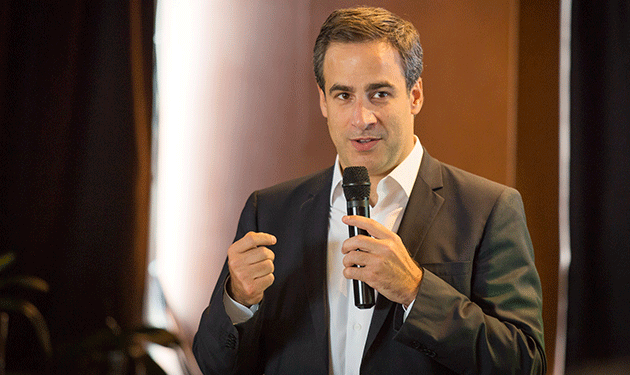The Executive President of Rene Moawad Foundation, MP Michel Moawad, ensured that “one of the reasons lying behind our Lebanese crisis is neglecting the productive sectors, so the government should support these sectors to preserve our history”. He added “The reason behind the success of the Lebanese economy after the regime of Prince Fakhreddine, is the real support of the local production and the strong relation between the Lebanese citizen and his land.”
MP Moawad attended the CBI workshop, in cooperation with “Rene Moawad Foundation” in SmallVille Hotel- Badaro, to launch and discuss the project of exporting vegetables and fresh fruits to European and Regional Markets, funded by the Kingdom of Holland, in the presence of the Executive President of Rene Moawad Foundation, MP Michel Moawad, the ambassador of the Netherlands in Lebanon Jan Waltmans, the president of the agriculture committee in the Lebanese chambers union Roufayel Debbaneh, the general director of Rene Moawad Foundation Nabil Moawad, as well as exporters and representatives of the Chambers of Industry, Commerce& Economy, social and economic figures and representatives of governmental &non-governmental organizations.
MP Moawad highlighted that “the project that we are discussing today and that we expect that it will be quite successful, is a continuity of the supporting project of the “development of the green leafy vegetables and potatoes agriculture to enhance the living conditions in local communities”; a project funded by the Netherlands Embassy in Lebanon and has started two years ago and had a big success.”
He added: “the potatoes exportation program is the result of the signed convention between Lebanon and the European Union six years ago that allows Lebanon to export different agricultural products like potatoes to the European Union with no custom tariffs, up to 50 thousand tons per year.” He said: “however, for six years, Lebanon could not export potatoes due to its quality and criteria. So, we worked on this problem with the help of the Kingdom of Holland and we procured the necessary farms equipment to create a good relation with European importer, and export the Lebanese potatoes to Europe; this is what happened in 2018, when we succeeded to export the first container of potatoes to Europe while this year, we are planning to export 300 tons.”
MP Moawad explained that reason that disabled Lebanon to export the précised quantity of potatoes, i.e. 50 thousand tons, is the dereliction of the Lebanese government for not signing the annual agreements: “the remarkable success of the potatoes motivated us to go for a wider experience and therefore, export a variety of agricultural products to the European Union. Consequently, after carrying out a market study, three new products will be exported with potatoes and are: grapes, avocados& cherries.”
Moawad mentioned the beneficiary parties from this project that aims to support the sustainable economic development: farmers, Lebanese& foreign workers, endangered children, local agricultural communities, vegetables& fruits packaging centers, public& private institutions, cooperatives& agricultural experts. He also explained that this project includes six cazas that are: Akkar, North Lebanon, Baalbeck Al Hermel, Bekaa, Nabatieh, and South Lebanon.
He declared: “this project’s importance lies in creating a new approach for its contribution in transforming the Lebanese agriculture into a competitive one in new and modern markets. It also changed the old perspective into a new one asking for a market study before starting any agricultural activity. Moreover, the project introduced a new type of farmer support in order to achieve a sustainable development and enhance the partnership with the donor countries, the public& private sector, NGOs and the local communities.”
At the end, Moawad thanked the Kingdom of Holland who is a partner with our country and is concerned in the Lebanese issues and stability.”
The ambassador Waltmans expressed his happiness to attend this workshop, noting that “Holland’s priority is to support Iraq& Jordan and contribute in the humanitarian cases. For us, Lebanon should always remain a stable country, so we support your country and enhance the commerce between our countries, on different levels: agriculture, food manufacturing& nutritional ingredients. Next week, we will be on a commercial mission with 29 participants, including Rene Moawad Foundation, from Lebanon to Holland, in order to enhance the trading relations between both countries.”
He added: “we cooperated with Rene Moawad Foundation during the last years; and this cooperation was fruitful and led to the exportation of potatoes to the European Union for the first time. This successful experience is only the start, so we will continue for the four coming years, to include the exportation of avocados, apples, grapes& potatoes. And therefore, our goal is also to support the Lebanese farmers and increase their chance to export these products.”
Debbaneh explained that the Kingdom of Holland is supporting Lebanon and its products and said: “the challenge is to find the right ways to benefit from this project to export our products.”
Moreover, details of the project and the applied approach were discussed in the workshop, as well as an explanation presented by experts from Rene Moawad Foundation and CBI to mention the terms to apply to this project.
It is natable that CBI connects small and medium sized enterprises in developing countries to the European market and thereby, contributes to a sustainable and inclusive economic growth.







 العربية
العربية